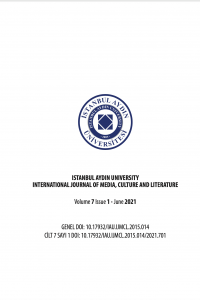Abstract
Each war has its own actors, who control its path and narrative. From the moment the war is declared until it ends, it takes the form of a linguistic act. This includes the involvement of translators and interpreters who play a major role in elaborating the narrative of war. This article sheds light on the role of translators and interpreters during wartime and conflicts and how they influence the public narrative. The research adopts the archival method based on previous studies conducted in this field, using as an example American translators with Japanese origins during World War II (WWII) and Iraqi translators, who worked with the US forces during the war on Iraq. The findings of the article stress the crucial role of translators and interpreters during wars and conflicts, as well as the different tasks they perform, including linguistic mediation.
Supporting Institution
Istanbul Aydin University
Project Number
One
Thanks
To those who never give up..
References
- Baker, M. (2006) Translation and Activism Emerging Patterns of Narrative. The Massachusetts Review, 47(3).
- Baker, M. (2006). Translation and Conflict: A Narrative Account. Routledge Taylor & Francis Group.
- Baker, M. (2010). Interpreters and Translators in the War Zone: Narrated and Narrators. The Translator, 16(2).
- BBC Radio Four. (2007) Face the Facts: Iraqi Interpreters, 20 July. Available at http://www.bbc.co.uk/radio4/facethefacts/transcript_20070720.shtml.
- Briggs, C. (1996). Disorderly Discourse: Narrative, Conflict, and Social Inequality. Oxford University Press.
- Chilton, P. (1997). The Role of Language in Human Conflict: Prolegomena to the Investigation of Language as a Factor in Conflict Causation and Resolution. Current Issues in Language & Society, 4(3).
- Inghilleri, M. (2008). The Ethical Task of the Translator in the Geo-Political Arena. Translation Studies, 1(2).
- Levinas, E. (1989). Ideology and idealism. In S. Hand (Eds), The Levinas Reader (pp. 235-260). Oxford: Basil Blackwell
- Palmer, J. (2007). Interpreting and Translation for Western Media in Iraq. Translating and Interpreting Conflict, 28, 13-28
- Rafael, L. (2007). Translation in Wartime. Public Culture, 19(2).
- Saar, E. & Novak, V. (2005). Inside the Wire: A Military Intelligence Soldier’s Eyewitness Account of Life at Guantánamo. The Penguin Press.
- Somers, R. & Gibson, G. (1994). Reclaiming the Epistemological ‘Other’: Narrative and the Social Constitution of Identity. Oxford: Blackwell.
- Takeda, K. (2009). War and Interpreters. Across Languages and Cultures, 10(1).
- Williams, K. (2006). Love My Rifle More Than You: Young and Female in the US Army. London: Weidenfeld & Nicolson.
Abstract
Project Number
One
References
- Baker, M. (2006) Translation and Activism Emerging Patterns of Narrative. The Massachusetts Review, 47(3).
- Baker, M. (2006). Translation and Conflict: A Narrative Account. Routledge Taylor & Francis Group.
- Baker, M. (2010). Interpreters and Translators in the War Zone: Narrated and Narrators. The Translator, 16(2).
- BBC Radio Four. (2007) Face the Facts: Iraqi Interpreters, 20 July. Available at http://www.bbc.co.uk/radio4/facethefacts/transcript_20070720.shtml.
- Briggs, C. (1996). Disorderly Discourse: Narrative, Conflict, and Social Inequality. Oxford University Press.
- Chilton, P. (1997). The Role of Language in Human Conflict: Prolegomena to the Investigation of Language as a Factor in Conflict Causation and Resolution. Current Issues in Language & Society, 4(3).
- Inghilleri, M. (2008). The Ethical Task of the Translator in the Geo-Political Arena. Translation Studies, 1(2).
- Levinas, E. (1989). Ideology and idealism. In S. Hand (Eds), The Levinas Reader (pp. 235-260). Oxford: Basil Blackwell
- Palmer, J. (2007). Interpreting and Translation for Western Media in Iraq. Translating and Interpreting Conflict, 28, 13-28
- Rafael, L. (2007). Translation in Wartime. Public Culture, 19(2).
- Saar, E. & Novak, V. (2005). Inside the Wire: A Military Intelligence Soldier’s Eyewitness Account of Life at Guantánamo. The Penguin Press.
- Somers, R. & Gibson, G. (1994). Reclaiming the Epistemological ‘Other’: Narrative and the Social Constitution of Identity. Oxford: Blackwell.
- Takeda, K. (2009). War and Interpreters. Across Languages and Cultures, 10(1).
- Williams, K. (2006). Love My Rifle More Than You: Young and Female in the US Army. London: Weidenfeld & Nicolson.
Details
| Primary Language | English |
|---|---|
| Subjects | Communication and Media Studies |
| Journal Section | Research Article |
| Authors | |
| Project Number | One |
| Publication Date | June 1, 2021 |
| Acceptance Date | January 24, 2021 |
| Published in Issue | Year 2021 Volume: 7 Issue: 1 |
All site content, except where otherwise noted, is licensed under a Creative Common Attribution Licence. (CC-BY-NC 4.0)



